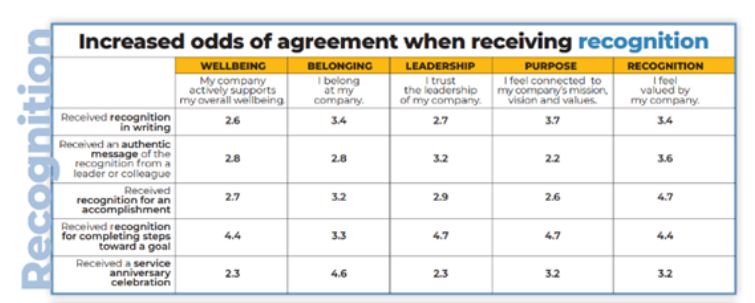5 ways recognition can support mental wellbeing at work
While awareness campaigns and support services are vital, the day-to-day workplace experience can also have a profound effect on employees’ wellbeing.
When it’s thoughtfully designed and genuinely inclusive, recognition becomes a cultural lever – boosting wellbeing, creating belonging and making mental health support feel tangible. It signals that people aren’t just seen for what they do, but for who they are.
The results speak for themselves.
Employees who receive recognition are up to 4.4x more likely to feel their company supports their wellbeing, and 3.3x more likely to say they feel a sense of belonging, according to BI WORLDWIDE’s The New Rules of Engagement research 2024.
Recognition for specific contributions sees similarly strong outcomes – with a 2.7x boost to wellbeing and a 3.2x boost to belonging.

The takeaway is clear; regular and authentic recognition has a profound impact on day-to-day employee wellbeing.
Here are five ways recognition actively reinforces a healthier, more inclusive workplace culture – and drives stronger mental wellbeing across the board:
1. Recognition encourages a sense of belonging
The sense of being part of something – feeling valued and included – is fundamental to both employee engagement and wellbeing.
BI WORLDWIDE's research highlights ‘fostering belonging’ as critical elements of commitment and performance.
For people facing mental health challenges, being part of a team can shape how they feel at work.
Regular, authentic recognition helps reinforce that belonging – it breaks down isolation, builds a culture of care, and ensures everyone feels seen, not just for their outputs, but for their presence and impact.
Service anniversary celebrations, for example, increase the odds of employees feeling a sense of belonging by 4.6x – a powerful nudge towards connection and continuity.
2. It builds psychological safety
The freedom to speak up, take risks and be vulnerable is reflective of a healthy working culture.
But it doesn’t happen by accident. Recognition helps shape it.
By reinforcing not just achievements but behaviours, too, recognition sets a tone: it’s safe to be open here, to try, make mistakes and be human.
Whether it’s celebrating a colleague for helping others, showing empathy or simply checking in on teammates, recognition can normalise compassion in action.
Authentic recognition from a leader or colleague increases the feeling of being valued (3.6x), reinforcing that it’s safe to bring your full self to work.
3. It lifts self-esteem and reduces stress
At its best, recognition reminds people of their worth.
For employees living with anxiety, stress or depression, that simple affirmation can be profoundly protective.
Employees who receive regular recognition, whether it’s verbal, written, or a reward, are up to 4.4x more likely to say their company supports their overall wellbeing, including mental health, according to BI WORLDWIDE.
Recognition tied to goal progression had the highest wellbeing impact (4.4x), showing how recognising effort – not just results – builds confidence and emotional resilience.
Even more striking are the figures for non-cash rewards: employees who received an experience as an award reported a 4.3x increase in wellbeing, and those who received merchandise reported a 4.4x increase.
These tangible, personalised forms of reward go beyond a quick morale boost and instead build long-term self-worth and connection.
4. It champions inclusive behaviour
Recognition also has the power to spotlight (and multiply) the right cultural signals.
That includes inclusive actions like mentoring across differences, calling out bias or making space for underrepresented voices.
What a company recognises gets repeated, and through formalising recognition around inclusive behaviours, organisations make equity visible - not just aspirational.
It moves inclusion from policy to practice, and helps build an environment where everyone, regardless of background or mental health status, can contribute and thrive.
5. It makes wellbeing part of the cultural fabric
Too often, wellbeing lives in the HR corner, adjacent to culture, but not embedded in it.
Recognition can change that.
When leaders and peers actively recognise wellbeing-focused behaviours, from taking rest seriously to supporting mental health initiatives, it becomes part of the norm, not the exception.
And it pays off.
BI WORLDWIDE’s research shows that even small acts of recognition (such as written or verbal thanks) can significantly boost wellbeing.
In fact, a simple written message increases the odds of an employee feeling supported in their wellbeing by 2.6x – rising to 4.4x when recognition is tied to achieving goals.
Employees who received recognition also reported greater feelings of pride, happiness and motivation – all of which buffer stress and improve day-to-day emotional resilience.
A culture of recognition is a culture of care
Recognition is arguably one of the most powerful yet underused tools for driving mental wellbeing at work.
When it’s fair, frequent and values-led, it helps employees feel safe and supported. It helps people feel connected to purpose and to each other.
And in doing so, it lays the foundation for strong mental health across the organisation.
Because when people are seen, supported and celebrated, they do their best work – and bring their whole selves to it.
Supplied by REBA Associate Member, BI WORLDWIDE
BI WORLDWIDE is a global engagement agency delivering measurable results for clients through inspirational employee and channel reward and recognition solutions.








